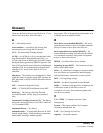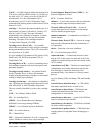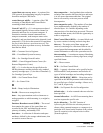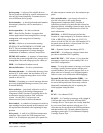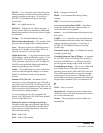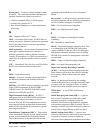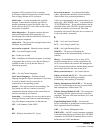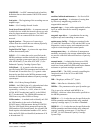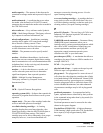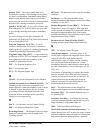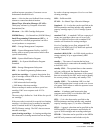
1st ed., 6/30/04 - 312579601
658 VM/HSC 6.0 System Programmer’s Guide
device group— A subset of the eligible devices.
Device groups are defined by esoteric unit names but
also may be created implicitly if common devices
exist in different device groups.
device number— A four-digit hexadecimal number
that uniquely identifies a device attached to a
processor.
device separation— See drive exclusion.
DFP— Data Facility Product. A program that
isolates applications from storage devices, storage
management, and storage device hierarchy
management.
DFSMS— Refers to an environment running
MVS/ESA SP and DFSMS/MVS, DFSORT, and
RACF. This environment helps automate and
centralize the management of storage through a
combination of hardware, software, and policies.
DFSMS ACS routine— A sequence of instructions
for having the system assign data class, storage class,
management class, and storage group for a data set.
DHB— See Database Heartbeat record.
directed allocation— See drive prioritization.
disconnected mode— A relationship between a host
and an ACS. In this mode, the host and an ACS are
not capable of communicating (there are no online
stations to this ACS).
DOMed— Pertaining to a console message that was
previously highlighted during execution, but is now
at normal intensity.
drive exclusion— (previously referred to as device
separation) refers to the Storage Management
Component (SMC) function of excluding drives for
an allocation request based on SMC exclusion
criteria. See the SMC Configuration and
Administration Guide for more information.
drive loaded— A condition of a transport in which a
tape cartridge has been inserted in the transport, and
the tape has been threaded to the beginning-of-tape
position.
drive panel— A wall of an LSM that contains tape
transports. Drive panels for 9840 transports have
either 10 or 20 transports per panel; drive panels for
all other transports contain up to four transports per
panel.
drive prioritization— (previously referred to as
directed allocation) refers to the Storage
Management Component (SMC) function of
influencing selection of a particular drive based on
allocation criteria, including volume location. See the
SMC Configuration and Administration Guide for
more information.
DRIVEid— A DRIVEid uniquely defines the
location of a tape transport by its location within an
LSM. A DRIVEid is of the form AA:LL:PP:NN
where AA is the ACSid, LL is the LSM number, PP is
the panel where the drive is located, and NN is the
drive number within the panel.
DSI— Dynamic System Interchange (JES3).
dual LMU— A hardware/µ-software feature that
provides a redundant LMU capability.
dual LMU HSC— HSC release 1.1.0 or later that
automates a switch-over to the standby LMU in a
dual LMU configuration.
dump— To write the contents of storage, or of a part
of storage, usually from an internal storage to an
external medium, for a specific purpose such as to
allow other use of storage, as a safeguard against
faults or errors, or in connection with debugging.
Dynamic Device Reconfiguration (DDR)— An
MVS facility that allows a dismountable volume to
be moved and repositioned if necessary, without
abnormally terminating the job or repeating the
initial program load procedure.
E
ECAP— See enhanced CAP.
ECART— (1) Cartridge system tape with a length of
1100 feet that can be used with 4490 and 9490
Cartridge Drives. These tapes are visually identified
by a two-tone (black and tan) colored case. (2) A
value that can be specified on the MEDia parameter
and that includes only 36-track enhanced capacity
cartridge system tapes. (3) See Enhanced Capacity
Cartridge System Tape.








